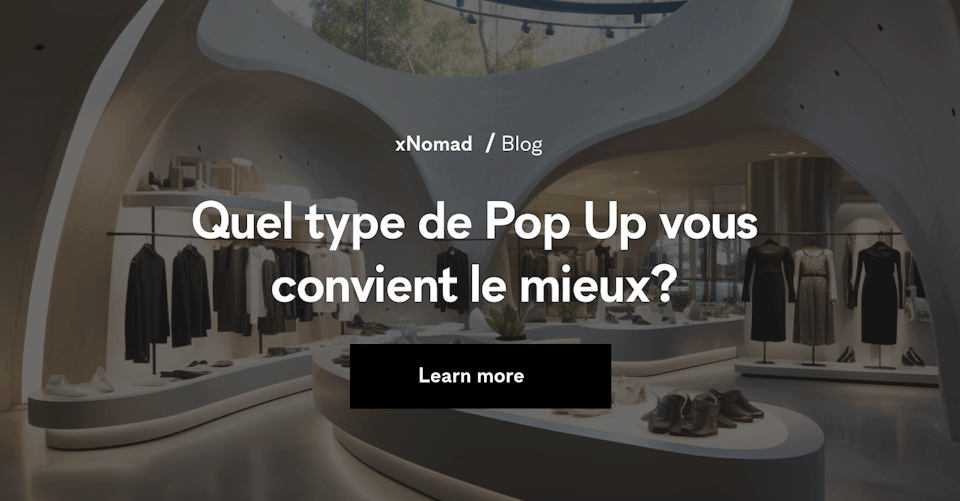Which Kind of Pop Up is Right for You?
Pop ups have gained significant popularity in recent years, allowing brands to engage with customers in a more personalized and temporary setting. However, with different types of pop up formats available, it's essential to choose the right one for your specific goals and target audience to ensure that you get the desired outcome. In this article, we’ll explore four popular types: sales-driven pop ups, experience-driven pop ups, showrooms and event spaces. Let’s dive in!

Share
1. Pop Up Stores
Pop up shops are by definition temporary retail locations that let brands interact with clients in more intimate and immersive ways. They provide flexibility, creativity, and the ability to convey a sense of exclusivity and urgency. There are two main subcategories of pop ups: experience-driven and sales-driven, let’s get into the differences between them!
a. Sales-Driven Pop Up
Sales-driven pop ups focus on generating immediate sales and maximizing revenue during the temporary period. These pop ups typically mimic a traditional retail setup, offering a physical space where customers can browse and purchase products. They are particularly effective for introducing new product lines, testing market demand, and clearing excess inventory.
Sales-driven pop ups cater to customers who are ready to make a purchase and appreciate the convenience of a physical store. Due to this, they tend to be smaller than experience-driven pop ups as this helps focus attention and guide users' customers to the products for sale.
b. Experience-Driven Pop Up
Experience-driven pop ups prioritize creating a unique and memorable experience for customers. These pop ups focus less on immediate sales and more on brand building, customer engagement, and creating a lasting impression. They often feature customization and personalization such as interactive installations, workshops, or special events to immerse visitors in the brand's story and values.
2. Showroom
A showroom pop up is a distinct type that prioritizes product showcasing and interaction rather than facilitating immediate sales. Showrooms provide a curated and visually appealing environment where customers can engage with products directly. They are particularly effective for brands or artists with visually appealing products, such as art, or complex features, such as new technology, that require hands-on interaction.
This means they are ideal for highlighting product quality, demonstrating features, and offering a personalized experience to customers. They can help build brand credibility, allow customers to touch and feel the products, and create a lasting impression through eye-catching displays.
3. Private Event Space
Private event space pop ups focus on hosting exclusive events, product launches, workshops, or social gatherings. They offer a unique opportunity to create excitement, exclusivity, and a sense of community around your brand which provides a platform to showcase new products, engage with influencers, and foster connections with key stakeholders.
This may enable your brand to create memorable experiences, generate media coverage, and strengthen brand relationships with influencers and stakeholders. They are most appropriate when the goal is to create a buzz, reach a broader audience, and leave a lasting impression on event attendees.
xNomad helps your brand find the right space
Choosing the right type of pop up depends on your specific goals, target audience and resources. Sales-driven pop ups are suitable for immediate revenue generation, experience-driven pop ups focus on brand building and engagement, and showrooms prioritize product showcasing and interaction. Private event spaces are perfect for hosting exclusive events and creating a sense of excitement.
By aligning your pop up type with your objectives, you can create a successful and impactful retail experience. xNomad is here to help your brand navigate the pop up jungle and offer a broad range of pop ups, tailored to your needs.
Find your space in Stockholm, Berlin, and Paris today.
FAQs:
Q: What are the key differences between sales-driven and experience-driven pop ups?
A: Sales-driven pop ups prioritize immediate revenue generation and emulate traditional retail setups. Experience-driven pop ups focus on brand building, customer engagement, and creating memorable experiences.
Q: How do showrooms differ from traditional retail pop ups?
A: Showrooms prioritize product showcasing and interaction rather than immediate sales. They provide an opportunity to demonstrate product features, build brand credibility, and create a personalized experience for customers.
Q: What makes private event space pop ups unique?
A: Private event space pop ups focus on hosting exclusive events, product launches, or workshops. They generate excitement, foster community engagement, and provide a platform for connecting with influencers and stakeholders.
Q: Can I combine different types of pop ups?
A: Absolutely! Brands can explore hybrid pop up concepts by combining elements of different types. For example, a brand can have a sales-driven pop up with interactive showroom elements or host events within a showroom space to create a multi-dimensional experience. The sky's the limit!